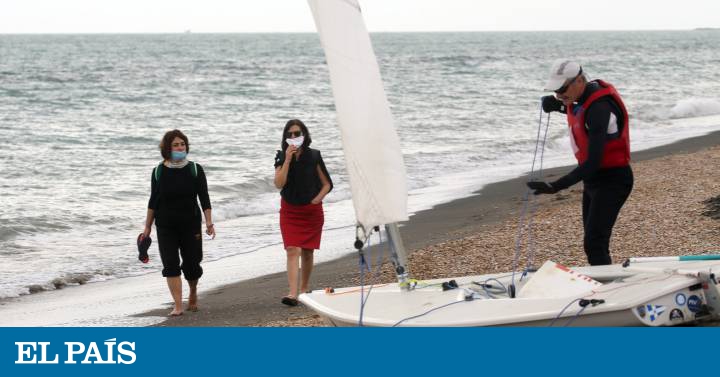MORE INFORMATION
The winter dream: tourism after the departure of the Covid-19- How the virus is going to mutate our cities
- Mexico's hotel strategy to avoid leaving thousands of tourists on the street
- The before and after of four empty historic cities at Easter due to the coronavirus
The tourism business lobby, the WTTC (World Travel and Tourism Council), pointed out in a 2019 report that in Spain its sector was already the one that contributed the most to GDP with 14.6%, above construction, the commerce or health and with 2.8 million jobs it became the second "generator" of employment. In May 2020, in the midst of a global crisis, the World Tourism Organization speaks, however, of global falls in the sector of up to 22%, which are perceived to be even stronger in Spain. Meanwhile, a multi-owner of tourist apartments on Airbnb in Madrid reports uneasily: "I have put the 15 apartments at Idealista, to see if I can get some money back, although they pay less there. I don't think I can rent any."
The recent statements of the Minister of Consumption on the structural weakness of the tourism economy in Spain, its high rates of temporary employment (seasonality) and its low wages (precariousness), have ended up upsetting the game board of a sector that until now he felt fully legitimized, unquestionable. The truth is that the tourism sector has an average salary 17% lower (19,000 euros a year) than the Spanish average, 30% lower than the industry (27,000 a year), with a temporary rate exorbitant workforce and 60% with part-time contracts, according to the employer's own. And is that the Minister falls short in his statements by not including the Spanish real estate tourism of the last 50 years and its geography of money laundering, prevarication and crimes on land use and urban planning, perfectly explained in the documentary on the life, work and death of Jesús Gil, The Pioneer . A predatory model of virgin soil that has affected not only the poor conditions of the majority of its workers, but the cost and ways of life of its populations, overexploitation of the soil, deterioration of public services and infrastructure, and especially the environment, polluting air and water, accelerating deforestation, drought and climate change. It also establishes itself as one of the main greenhouse gas emitters and polluters in the world, according to a study published in Nature , despite its nickname "industry without chimneys". What is nothing more than the paradoxical autophagy of tourism.
Will we be facing the intensification and a return to the retro of the resort and spa model? Will it be the definitive flourishing of closed tourist developments?
Once other niche markets were looted and as lifeguards in the previous Great Recession (2008-2016), the new speculative operations of the tourism financial sector were set in large cities as a refuge-strategy. This had made urban tourism more than ever a central element in the spatial, economic, social and cultural transformation of metropolitan territories around the world. Touristification, understood as the result of the complete transformation of the urban space into a tourist space, has been the result of a multifaceted process of urban change promoted by local and transnational agents and closely related to improving tourism competitiveness and capacity of attracting visitors.
Until the arrival of the global epidemic of covid-19, this process that was intensifying was clearly manifested in the hyperpresence of tourists in central areas, in the increase in economic and consumption activities developed for tourists, in outsourcing and hotel accommodation, in urban mobility businesses (uber, segways, rental bicycles, tuktuks ...), in the rise of fast food, franchisees, low-cost bars, hospitality markets supply and urban cloning of the great global clothing and restaurant chains.
Now this phagocytizing dynamic of the urban is in a impasse. Without going any further, the Airbnb model is in the midst of a global crisis and begins to return part of the homes to the traditional rental sector. In the Central District of Madrid - the main area affected by the professionalization, monopolization and concentration of Airbnb in Madrid - there were only 1,300 homes offered on traditional rental portals in 2019. Today, in the midst of a pandemic crisis, we are at 4,000. In Barcelona, 40% of tourist flats have already returned to the residential rental market. One of the questions to be examined, therefore, will be whether the large metropolitan agglomerations - as vortexes of contagion in pandemics - will no longer be desired by the tourist. Now that necrotourism is at home and does not seem to have the slightest grace, will the tourist stop wanting to live the experience of living like a local (likealocal ) in the cities? Will this fall drag an entire economy of urban precariousness, sustained on the "uberized" workers? How will platform capitalism in the post-COVID19 era and tourism (really existing) in the city be rearticulated?
Thus, if these lives clad in masks and gloves have come to stay, and the tourist's gaze turns from the city to other aseptic spaces, a possible dystopian angle opens up that consolidates businesses around "prophylactic tourism". Will we be facing the intensification and a return to the retro of the resort and spa model? Will we be facing new processes of fencing of common goods (beaches, rivers, mountains)? Will it be the definitive flourishing of closed tourist developments? Will safe tourism be the fashion label for business, with parceled beaches and beach watchers running wild with their thermometers as the new WHO blue flags fly in the Mediterranean? Perhaps, once again, everything changes so that nothing changes.
Jorge Sequera ( @jorgesekera) is professor of Sociology at UNED and Scientific Coordinator of the research project “LIKEALOCAL: Socio-spatial effects of Airbnb. Tourism and Transformation in 4 cities in Spain ”

